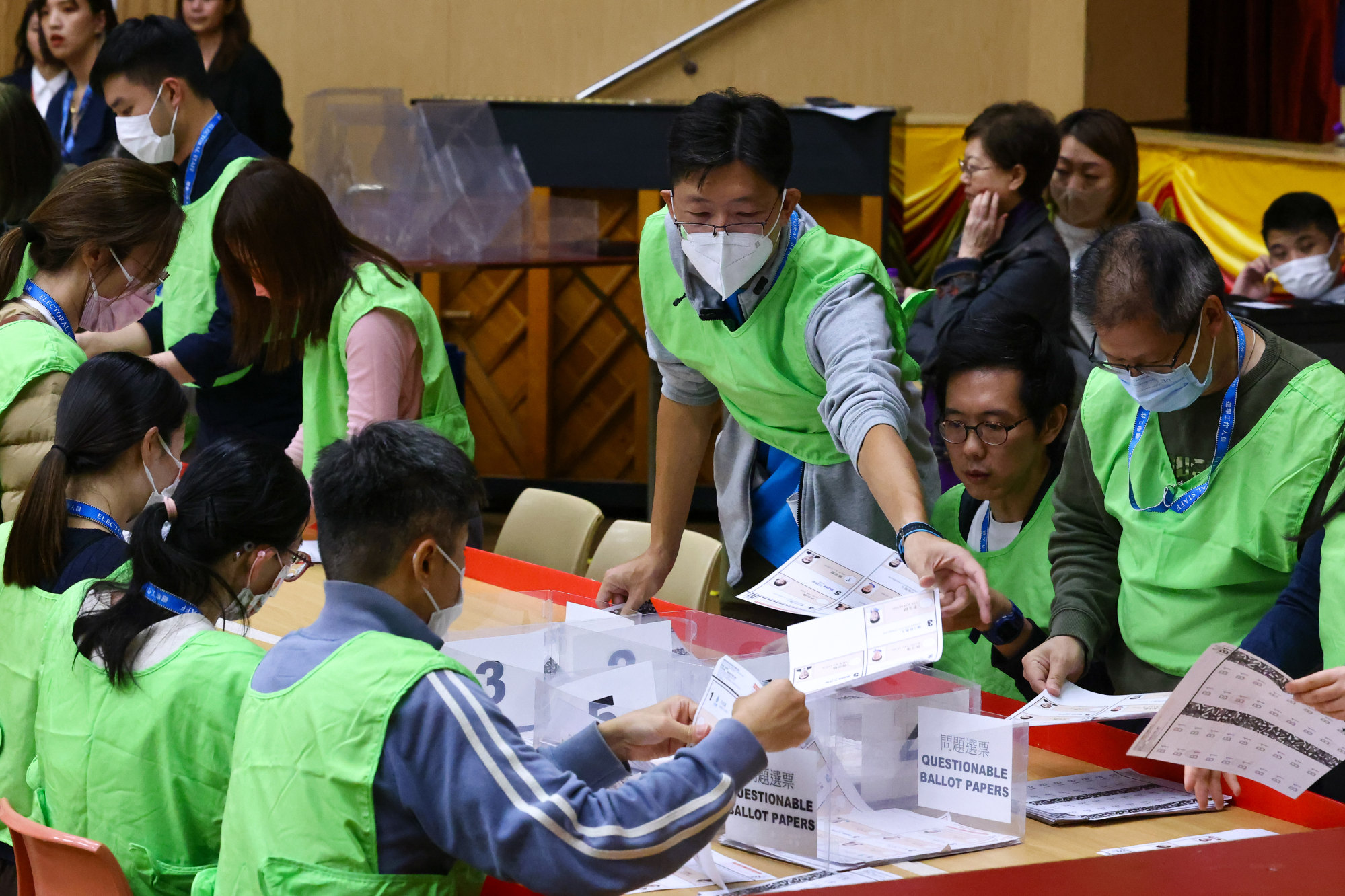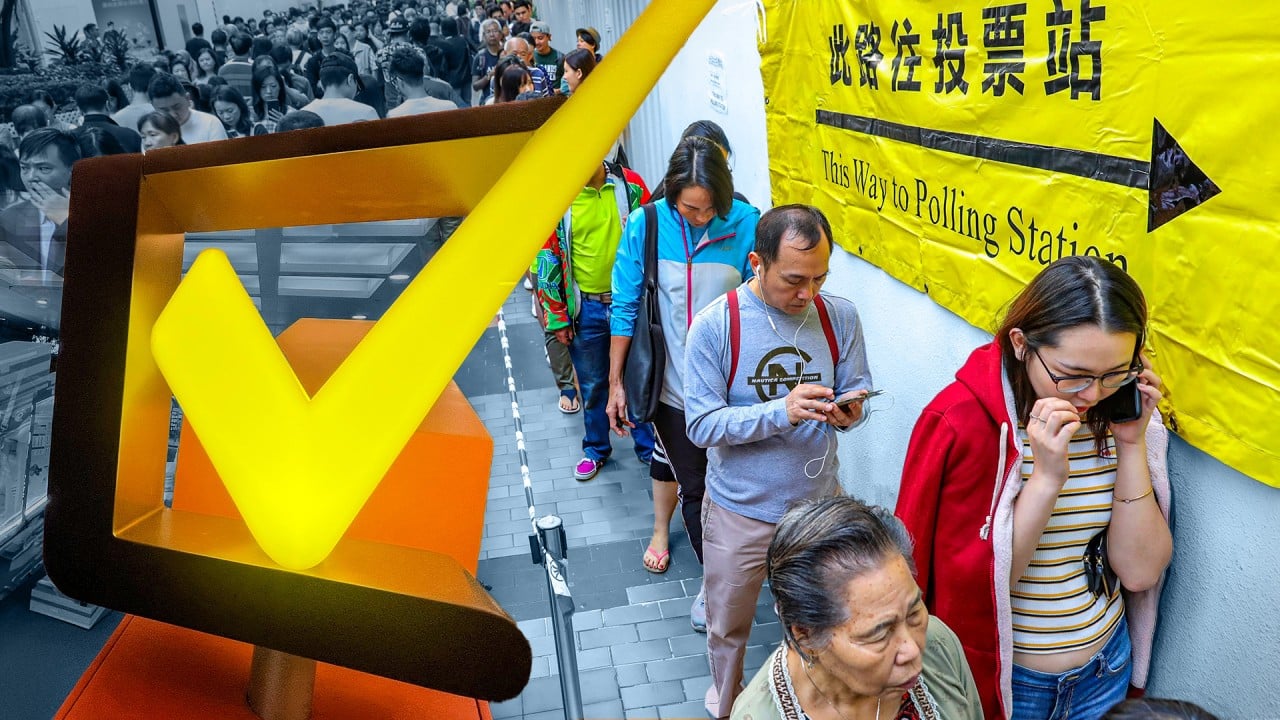
Hong Kong’s first ‘patriots-only’ district council election shows ‘real, functioning democracy’, Beijing and local authorities say despite record-low turnout
- District council election logs record-low turnout of 27.54 per cent, but city leader John Lee lauds ‘high-quality’ poll
- Beijing and its local offices offer congratulations to winning candidates, say vote important in implementing the principle of ‘patriots governing Hong Kong’
The election winners should focus on improving the livelihoods and well-being of residents, Beijing’s top office overseeing Hong Kong and Macau affairs said in a statement setting out five expectations of the newly elected councillors.
The to-do list was centred on ensuring effective implementation of the “one country, two systems” governing principle, resolving conflicts and uniting society.
Hong Kong election body under fire over computer system failure in district poll
City leader John Lee Ka-chiu also lauded Sunday’s “patriots-only” election as a “high-quality one”, despite a computer glitch that caused the electronic poll register to malfunction, and prompted authorities to extend voting by 90 minutes, to midnight.
A visibly stern Lee overnight announced the setting up of a task force to look into the matter and submit a report in three months.
Regular hourly reporting on turnout numbers was also disrupted following the breakdown, with authorities only announcing the final figure almost eight hours after polling ended, breaking from usual practice.
The data released on Monday morning showed that 1,193,193 people – or 27.54 per cent of registered electors – had voted, the lowest participation rate on record since the city’s return to Chinese rule in 1997.

In Sunday’s poll, the city’s biggest pro-establishment party, the Democratic Alliance for the Betterment and Progress of Hong Kong (DAB), emerged as the biggest winner, securing 109, or 40 per cent, of the 264 seats up for grabs.
The Federation of Trade Unions attained the second-highest number of seats, with 27 of its 46 candidates winning. The New People’s Party and the Business and Professionals Alliance took 15 and 12 seats, respectively.
Some middle-of-the-road parties lost all the seats they contested in the geographical constituencies, including Roundtable and Path of Democracy.
Other previous lows in voter turnout at district council polls were in 1999 when 35.82 per cent voted and in 2007, when 38.83 per cent went to the polls.
Will Beijing be happy with turnout for Hong Kong district council election?
The highest turnout came during the previous municipal-body poll in 2019 at the height of anti-government protests, when the participation rate hit 71.23 per cent. The opposition scored a landslide victory, riding on the protests and a pledge to take on Beijing.
Sunday’s voter turnout was more comparable with the Legislative Council election under the revamped “patriots-only” rule in 2021, which logged a rate of 30.20 per cent.
Despite the record low turnout, the State Council’s Hong Kong and Macau Affairs Office lauded residents for getting out to vote and countering the “smearing” of the poll.
“The district councils have restored their proper nature and functions, freeing the election from politicisation, populism and pragmatically focusing on solving real problems in the community,” the office’s statement said.
“Residents can deeply feel that the elections are related to their interests and that this is real, functioning democracy.”
The five expectations laid down by the office for those elected were to put more effort into implementing the one country, two systems governing principle, resolving conflicts, doing practical things for residents, uniting society and fulfilling their duties.
Beijing’s liaison office in Hong Kong said the election demonstrated “healthy competition” and “effectively promoted Hong Kong out of the politicised and black election culture”.
The central government’s Office for Safeguarding National Security and the liaison office in Hong Kong also praised the “fair and open” election for putting the city back on the right track.
A closer look at polling data showed that among those who voted, 22,045 residents cast blank or invalid ballots, representing 1.85 per cent of the overall figure, while the rate was 0.56 per cent four years ago.
Authorities had gone to great lengths organising events to get out the vote, including holding fireworks, free museum entry and fun fairs, prompting analysts to suggest turnout might have been worse if nothing had been done to promote the election.
Putting a positive message on the outcome, the chief executive said the vote demonstrated Hong Kong’s “excellent election culture and highlights the revamped district council system as being far superior”.
But foreign observers, including the Hong Kong Watch Group under the European Parliament, condemned what it described as a “neither free nor fair” election which had shut out opposition representation and reiterated its call for targeted sanctions against Lee.
Electoral Affairs Commission chairman Mr Justice David Lok Kai-hong on Monday apologised for the system glitch, turning teary-eyed when he expressed guilt towards staff for their hard work and indicated he was willing to be held responsible.
“We have to be responsible and follow up and investigate [what went wrong],” Lok said.
Counting of the 1.19 million ballots began only after midnight at the more than 600 polling stations. The voters cast ballots for 88 directly elected seats, out of 470 in total. The city leader will choose 179 others in the coming days, with local committees deciding on another 176 and rural leaders being given the remaining 27 seats.
Will Beijing be happy with turnout for Hong Kong district council election?
Veteran politician Tam Yiu-chung, who formerly served as the city’s sole delegate to the nation’s top legislative body, insisted that the voter turnout was “reasonable”.
Since the social environment had stabilised, voters had less motivation to vote as they knew all the candidates were patriotic, Tam told a radio show on Monday morning.
The winners of the poll will begin their four-year term of office on January 1. New People Party’s chairwoman Regina Ip Lau Suk-yee, also the convenor of the Executive Council, said Beijing expected the focus now to be on delivering results.
“Now that they’ve been elected, they must work diligently as district councillors and speak sensibly, so that they can give credit to the new system,” she said.
Additional reporting by Connor Mycroft



